Report on Preparing for Dorfman’s Delirium: Pre-theatre discussion with Greg Homann, director, and the cast of Ariel Dorfman’s Delirium (playing at the Barney Simon Theatre at the Market).
Session 4 of the M&G Literary Festival: Friday 31 August, Market Theatre.
KARL VAN WYK
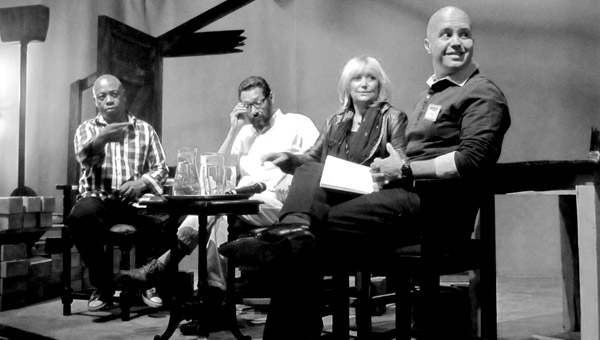
The cast and director in conversation prior to doing their show: actors Fezile Mpela, David Dennis, and Fiona Ramsay, with director Greg Homann
Waiting in the foyer outside the Barney Simon Theatre, the bustling Joburg audience were allowed into the venue five minutes after the scheduled time, something which at least two irate ticket-holders did not allow to pass unnoticed. Despite this, the mood as we took our unreserved seats was one of keen interest – the prospect of sitting down to a pre-performance discussion with the South African cast and director of Chilean-American playwright Ariel Dorfman’s Delirium was more than interesting.
The discussion was chaired by director Greg Homann, with the cast of three, David Dennis, Fiona Ramsay, and Fezile Mpela, completing the panel. After a brief introduction by Darryl Accone, books editor of the Mail & Guardian, Homann began by providing a brief introduction to Dorfman’s work, the play and its cast. (Dorfman was meant to be at the festival, but got caught up in the domestic complexities of moving house, Accone informed the audience.)
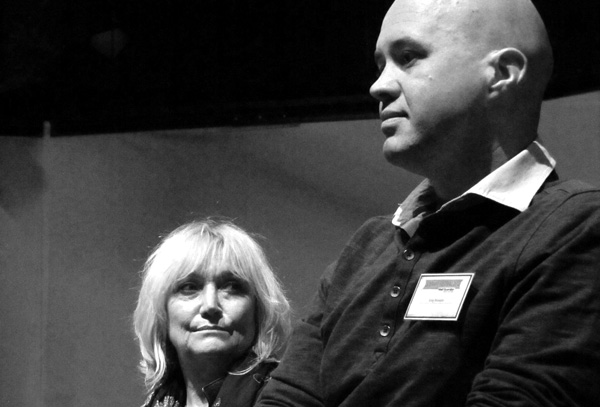
The verbally astute Fiona Ramsay and her director, Greg Homann
Referring to a little booklet in his hands (the playscript), containing, from my limited vantage point, notes, scribblings, and highlighted passages in blue, Homann described the play’s first life as “The Other Side”, a piece Dorfman wrote ten years ago after he was commissioned by the New National Theatre of Japan to write something about borders. Despite the play’s success, Homann tells us, Dorfman remained unsatisfied with the final product, preferring to write a play which could be shown in a polyphonic society, one unlike Japan in which a single language dominates the land. So it came to be that Dorfman decided to stage Delirium’s world premier in South Africa, which had its first showing on Wednesday, 29 August.
However, it is not only South Africa’s multilingualism which attracted Dorfman to our country. On a very personal note, Homann explained, Dorfman first heard of his mother’s death while visiting the country, and South Africa has held great significance for the playwright ever since. In addition, the play is concerned with the arbitrary cultural, religious, and national divisions people construct in order to prevent the inclusion of others, and Dorfman saw in South Africa a place with a history of exactly these hot-button issues – indeed, they seem to be as prevalent now as they were decades ago. Dorfman wanted to emphasise the idea that it was mainly through language that such divisions were concretised, said Homann. And so it was about the matter of language that Homann began a discussion with his cast.
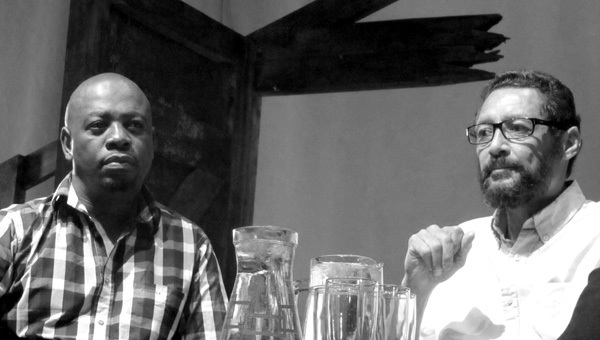
Actors Fezile Mpela and David Dennis looking right through the fourth wall
Delirium is an absurdist play involving a bi-racial couple, Atom Roma and Levana Julak, played by David Dennis and Fiona Ramsay, as well as a nameless border guard, played by Fezile Mpela, whose duty it is to ensure that peace is maintained by establishing a border between the previously warring nations of Constanza and Tomis. The absurd part comes when we, along with Atom and Levana, find out that the border must run through their house and right down the middle of their bed.
Atom was born in Tomis (where, in the play, so that we may understand, English serves as their official language), while Levana speaks Constanzan, a language fabricated by Dorfman himself. Constanzan is made up of leftovers, trinkets, and fragments of several other languages. Indeed, when Homann asks Ramsay about the borrowed nature of Constanzan, she responds by way of anecdote, referring to audience members who, after seeing the play, find it astonishing that she is able to speak “Spanish”, while other members are equally surprised to hear that the actress is fluent in “Polish”. Perhaps because she is a dialect coach, the issues of language and how “people become faceless when they can’t speak to you” were key interests motivating Ramsay, a sharp thinker if ever there was one, to pursue this project.
It was Dorfman’s decision, Homann commented, to create Constanzan as a polyphonic language. This gives the play with a kind of universality and helps the audience to see the parallels between the situation on stage and that of Syria, Berlin, or South Africa. In this case, Dorfman seems to go against the current notion that the more specific a depiction is, the more universally it will resonate (50 years ago, it used to be the other way around). Homann acknowledges that he tried to stage the production in ways that would not “[limit] the reading of the play”. This is also true of the guard’s costume – as Mpela explains, it is daubed in white paint to “[secure] the neutrality of the guard”.
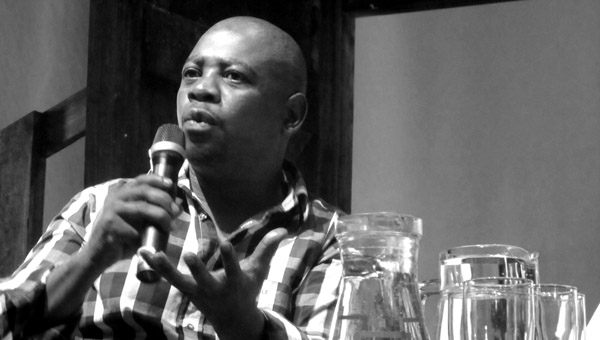
Fezile Mpela talks about guarding the borders of language
While the themes may be dense, the story is by no means out to trick the audience. This is despite the many instances in which Ramsay’s character, showing her brilliance at linguistic shuffling and lifting, speaks in Constanzan during the play. Indeed, while the themes have strong political links, Dennis tells us that the play is about how people respond to language emotionally. Homann, on the other hand, claims the play is really about the ways in which the state can have an impact on families. Certainly, in the play itself, the Guard accosts Atom and Levana, and the couple soon begin to suspect he is their long- lost son – a question which forms part of the play’s emotional centre.
After the discussion, the actors and director made their way backstage to prepare for the show. Thirty minutes later, the audience re-entered the theatre, where we were introduced to a wonderfully realised, “apocalyptic kind of world”, as Homann put it. Despite some heckling and occasionally inappropriate laughter, the audience seemed to respond strongly to the production and was caught up in the Beckettian whimsy of the narrative. This proved to be a finely acted play and a worthy festival event.
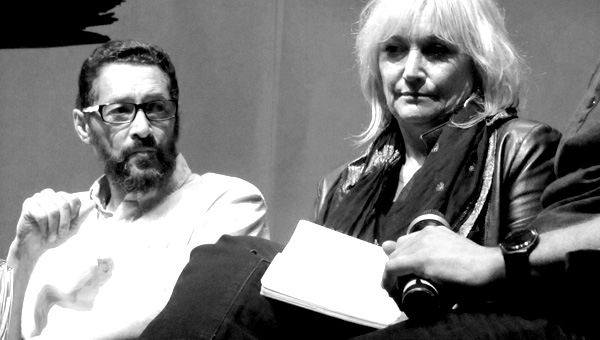
David Dennis and Fiona Ramsay reserve their energy for the night's imminent acting performance
 SLiPStellenbosch Literary Project
SLiPStellenbosch Literary Project